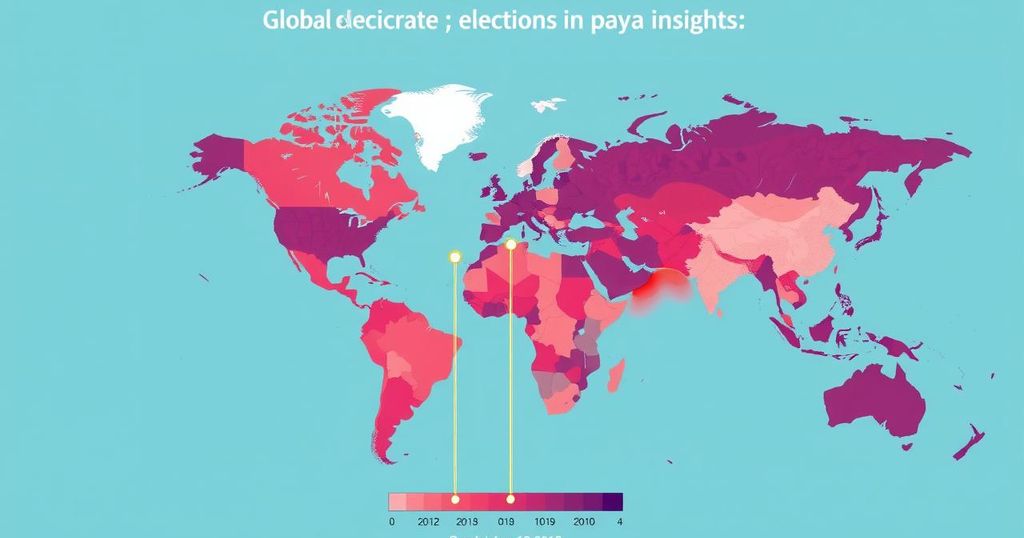In 2024, over 60 countries saw unprecedented voter turnout, with many elections driven by immediate economic concerns rather than collective interests. Results indicated significant shifts away from traditional incumbents, with notable victories for populist figures like Donald Trump and Keir Starmer. The elections underscored persistent issues of fear and greed among voters, leading to questions about the future of democracy amidst rising populism and economic challenges.
The year 2024 proved unprecedented in global participation, with over 60 nations, representing nearly half of the world’s population, exercising their democratic rights to elect leaders. However, the outcomes of these elections suggested a continuation of selfish and survivalist tendencies, as voters prioritized immediate economic concerns over collective needs. The votes reflected deep-seated motivations of fear and greed, culminating in surprising electoral shifts, such as the decisive victory of Keir Starmer’s Labour Party in the UK and Donald Trump’s resurgence in the United States.
Across the globe, many incumbents faced significant challenges as voters expressed dissatisfaction with their economic stewardship. In Germany, Chancellor Olaf Scholz was ousted after a no-confidence vote, underscoring the fragility of political support amidst a struggling economy. The discontent resonated in countries from India, where Prime Minister Narendra Modi saw a reduction in his party’s electoral share, to South Africa, where the ruling party lost its majority.
Interestingly, the 2024 elections highlighted a stark contrast between nations like Mexico, where the incumbent party made gains, and Bangladesh, where public protests led to the ousting of a widely distrusted leader. Prominent events included Macron’s snap elections in France post-EU parliamentary results and Putin’s controversial electoral practices in Russia, demonstrating varied electoral landscapes.
As the world navigates these complex democratic dynamics, the repercussions of the U.S. election results, particularly Trump’s potential policies towards Ukraine and global democracy, remain pivotal. The rise of populism, illustrated by declining voter support for traditional parties, raises concerns about the sustainability of democracy worldwide. The 2024 electoral outcomes suggest a growing trend towards isolationism and an ambiguous path forward for democratic ideals in the face of mounting global challenges.
The 2024 elections represented a significant milestone in global democracy, attracting nearly half of the world’s population across over 60 participating countries. This remarkable voter turnout is a historical first, reflecting the evolution of democratic participation. However, the subsequent voting outcomes revealed a concerning trend, as many voters opted for immediate economic solutions over long-term collective interests. In various nations, economic hardships led to the replacement of incumbents, while populism gained traction amidst discontent, raising questions about Europe’s political stability and the global state of democracy.
The 2024 electoral cycle illustrated the complex interplay between economic realities and democratic participation on a global scale. Despite unprecedented voter engagement, the results suggest that immediate self-interest can overshadow collective welfare. The rise of populist leaders and the fall of establishment parties highlight significant challenges that democracy faces in the current climate. As we look forward, the outcomes of these elections stand as a testament to the evolving nature of democracy, requiring steadfast vigilance to ensure a sustainable democratic future.
Original Source: www.cnn.com






